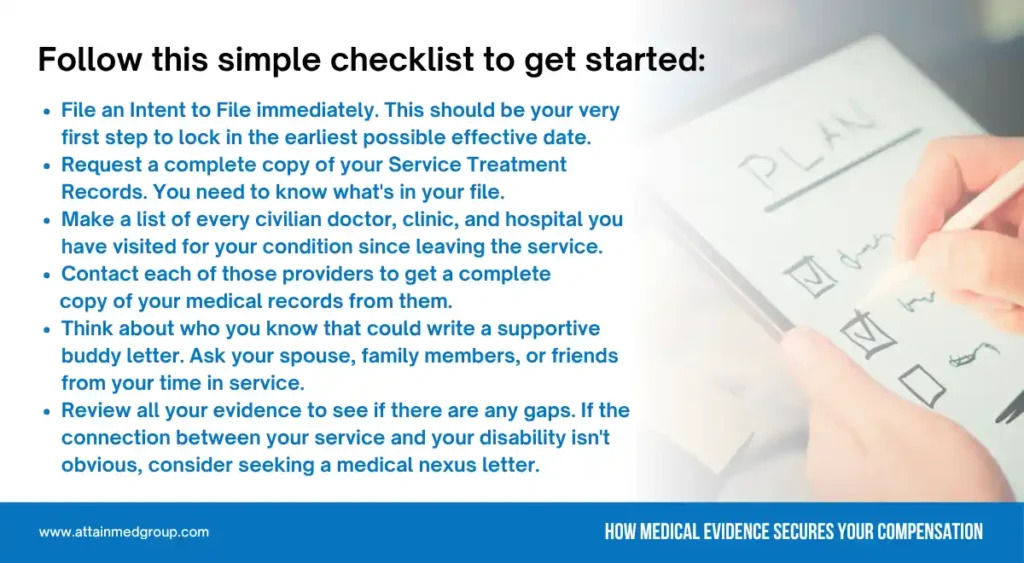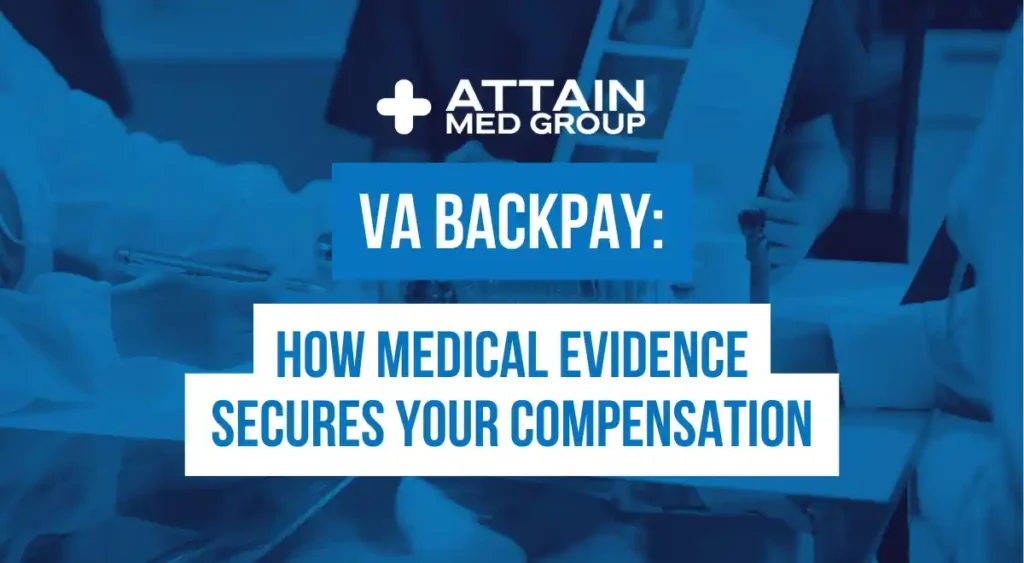You’ve served your country, and you’re dealing with a service-connected disability. You filed a VA claim, and you know you’re owed compensation. But the process can feel like a waiting game, leaving you wondering about the money you should have already received. This is where understanding VA backpay eligibility: the importance of medical evidence comes in. It’s the key to getting the compensation you’ve earned from the day you were eligible, not just from the day your claim was approved. Many veterans don’t realize that a successful claim isn’t just about getting a disability rating; it’s also about establishing the correct start date for your payments. That start date determines how much back pay you’ll get in a lump sum. We’re going to break down how this works and show you why your paperwork is so critical for VA backpay eligibility: the importance of medical evidence. Learn how the right documents can unlock compensation you already earned.

What Exactly is VA Back Pay?
Think of VA back pay as retroactive compensation. It’s the money the VA owes you from your effective date up to the date your claim is finally granted. You filed your claim, waited months or even years for a decision, and when it’s approved, the VA pays you for that waiting period. It’s not a bonus or some extra payment. This is money that was rightfully yours all along. The final amount can be significant, sometimes totaling thousands of dollars, depending on how long your claim was pending and your disability rating. The whole system is designed to make you whole from the point your disability became eligible for benefits. But the VA needs a very clear, evidence-based reason to set that date, and that’s where your records become your best tool.
The Effective Date is Everything
You’ll hear the term “effective date” a lot, and for good reason. This single date is the most important factor in calculating your back pay. It’s the official starting line for your benefits. The VA doesn’t just pick a date out of a hat. There are specific rules that govern how they assign an effective date. Getting this right is the difference between a small back pay check and a substantial one.
How the VA Decides Your Effective Date
The VA usually sets the effective date as the day they receive your claim. But there are important exceptions that can push this date much further back, meaning more compensation for you. This is why you need to know the rules. One major exception is if you file your claim within one year of leaving military service. In that case, the VA can set your effective date all the way back to the day after you were discharged. This rule acknowledges that it takes time to adjust to civilian life and gather the necessary paperwork. Another rule relates to new laws. If a change in law, like the PACT Act adding new presumptive conditions, makes you eligible for benefits, your effective date could be linked to the date that law was enacted. According to the VA, these changes create new opportunities for veterans to get the benefits they deserve.

The Power of an Intent to File
Filing a full VA claim takes time because you have to gather all your medical records and supporting documents. The VA knows this. That’s why they created the Intent to File (ITF) process. Think of an ITF as putting a bookmark in the calendar. By submitting a simple form, you tell the VA you plan to file a claim, and this officially preserves a potential effective date. You then have one year from that day to submit your completed application. If your claim is approved, your effective date will be the day the VA received your ITF, not your final application. This simple step can add up to a full year of back pay to your award. It’s one of the most effective tools a veteran has to maximize their compensation.
The Role of Medical Evidence in VA Backpay Eligibility:
The Importance of Medical Evidence. Learn How the Right Documents Can Unlock Compensation You Already Earned.
Your effective date and your back pay are directly tied to what you can prove with documents. Your word is important, but the VA runs on paperwork. Medical evidence builds a timeline that tells the story of your disability from its origin to the present day. Without a clear paper trail, the VA is likely to just use the date you filed the claim. But with the right evidence, you can prove your disability started earlier, securing an earlier effective date and the back pay that goes with it. Every piece of paper helps paint a clearer picture for the VA reviewer.
Your Service Treatment Records (STRs)
These are the official medical records from your time in the military. They are the most powerful evidence you can have because they create a direct link to your service. Did you go to sick call for a bad back? That visit is documented in your STRs. STRs show the VA that an injury or illness began while you were on active duty. If you claim a knee condition and your STRs show multiple visits to medical for knee pain, you’ve built a very strong foundation for your claim. This is what the VA looks for first.
Post-Service Medical Records
What if your condition didn’t really become a problem until after you left the service? This is common for many veterans. Your civilian medical records become just as important as your STRs. They show a continuation of care. Maybe that knee pain from service got much worse over the years, leading to a diagnosis of arthritis. Your doctor’s notes, X-ray results, and treatment plans all prove that the condition is chronic and ongoing. Consistent medical treatment after service is critical. It demonstrates to the VA that the problem that started in service didn’t just go away; it has been a continuous issue affecting your life.

Buddy Letters and Lay Statements
Sometimes, the official records don’t tell the whole story. You may not have gone to sick call for every single issue. This is where “buddy letters” or lay statements come in. These are written statements from people who knew you and can speak to your condition. A spouse could write about how they’ve seen your back pain affect you since you left the service. A fellow service member can write about an event that happened on deployment that wasn’t officially recorded. The VA will consider these statements as evidence. They help fill in the gaps and provide personal context that cold medical records often lack. They add a human element to your file.
The Mighty Nexus Letter
A nexus letter is a medical opinion from a qualified healthcare professional. This letter directly connects your current disability to a specific event, injury, or illness that occurred during your military service. It’s the missing link that ties everything together. For example, a doctor can review your STRs and your current medical files and write a letter stating that your current sleep apnea is “more likely than not” caused by the PTSD you developed in service. That expert opinion is incredibly powerful. While not always required, a strong, well-written nexus letter can make a difficult claim much easier to win. It hands the VA rater the medical justification they need to approve your claim and establish service connection.
Common Pitfalls That Delay or Deny Back Pay
Many veterans leave money on the table because of simple mistakes. Knowing what to watch out for can protect your claim and your back pay. Being proactive is your best strategy. One of the biggest issues is incomplete medical evidence. If there are large gaps in your treatment history, the VA may question whether your condition is truly chronic and related to your service. It’s vital to get copies of all your records, both military and civilian. Another problem is not appealing an incorrect effective date. Sometimes the VA makes a mistake and assigns a date that is too recent. You have the right to appeal that decision, but there are deadlines, so you need to act quickly if you believe the date is wrong.
Putting It All Together: A Veteran’s Checklist
Feeling overwhelmed by all the paperwork? Breaking it down into steps can help you stay organized and build the strongest case possible for the maximum back pay.

Conclusion
Getting the VA benefits you are owed can be a long road, but you don’t have to leave money behind. The key is understanding how the system works and being prepared. Your back pay isn’t just a random payment; it’s compensation you’ve already earned, and proving your case starts with strong evidence. It all comes back to VA backpay eligibility: the importance of medical evidence. Learn how the right documents can unlock compensation you already earned by building a clear, undeniable timeline for the VA. Title: VA Backpay Eligibility & Medical Evidence: Get Paid What You’re Owed

